Kukoyi Ibraheem A.1, Adedipe Abioye1, Aina Olayinka C.2, Adeyefa Emmanuel A.1, Iwuagwu Chinonso C.2
1Department of Hospitality and Tourism, Federal University of Agriculture, Abeokuta, Nigeria
2Department of Tourism and Events Management, Afe Babalola University, Ado-Ekiti, Nigeria
Correspondence to: Kukoyi Ibraheem A., Department of Hospitality and Tourism, Federal University of Agriculture, Abeokuta, Nigeria.
| Email: |  |
Copyright © 2015 Scientific & Academic Publishing. All Rights Reserved.
This work is licensed under the Creative Commons Attribution International License (CC BY).
http://creativecommons.org/licenses/by/4.0/

Abstract
The initiative and the vision of the Lagos State government to establish the Lagos Black Heritage Festival has been referred to as an open door opportunity to prosperity through tourism and an opportunity to expand the economic horizon of the state and the nation at large. The study evaluates the Lagos Black Heritage Festival as a means of promoting the culture and socio-economic advancement of Lagos State. The study was based on the 2015 edition which was the 6th time the festival is been held and coincidentally the valedictory version held in honour of the initiator of the festival. The study adopted survey method with the use of questionnaires, key informant interview and participant observation for data collection. A total of 400 questionnaires were administered physically to the respondents but only 387 questionnaires were returned valid. Data gathered were analyzed and presented with the use of simple percentages, charts and proximity matrix. Findings of the study revealed that about 80% of the participants at the festival have positive attitude towards it and 78.4% appreciates the culture of the host community. 84% of the participants had positive experiences during the festival and 71.3% were satisfied with the events and indicated that they would like to come for the festival another time. More so, some of the participants advised that the government should improve on awareness campaign for the festival and provide more security. The social concentration that occurs at festival time and the increased economic activities consolidates the sense of advancement that is of concern in this study. The temporary realignment that transforms public places and the local people in them during festival time is a manifestation of the changes that occur with daily community relationships. The study concludes that the Lagos Black Heritage Festival is a worthy means of promoting Lagos culture and socio-economic advancement. It is hoped that readers of this article would find this study useful.
Keywords:
Evaluation, Festival Promotion, Culture and Socio-Economic Advancement
Cite this paper: Kukoyi Ibraheem A., Adedipe Abioye, Aina Olayinka C., Adeyefa Emmanuel A., Iwuagwu Chinonso C., Evaluation of the Lagos Black Heritage Festival as a Means of Promoting Lagos Culture and Socio-Economic Advancement, American Journal of Tourism Management, Vol. 4 No. 4, 2015, pp. 77-88. doi: 10.5923/j.tourism.20150404.01.
1. Background of Study
There are many intangible reasons why a community chooses to host a festival such as socio-cultural, economic, political and environmental and each reason is not mutually exclusive (Backman et al, 1995). The initiative and the vision of the Lagos State government to establish the Lagos Black Heritage Festival has been referred to as an open door opportunity to prosperity through tourism and an opportunity to expand the economic horizon of the state and the nation at large. Prior to the establishment of the Black Heritage Festival in the year 2009, Lagosians in their various regions have always had their moments of communal celebrations in forms of street carnivals, community festivals/carnival, religious based festivals etc. They have always find a means of making these moments of celebration a success and this is still in place till date. Even though, the festivity and its fun filled atmosphere may be limited to the region where the festival is been held at given period. Events as diverse as the Lagos Black Heritage Festival is an important contributor to the local economy of its host community as it draw visitors from around the state and other regions. Many visitors return year after year, spreading the word among family and friends about the enjoyable time they have had. These events are also more likely to reflect the values, community passion and products of available resort, and provide a competitive edge over other destinations. In Lagos, such event as the Lagos Water Regatta is used in celebrating the aquatic splendor of Lagos, and the Lagos Carnival is used in celebrating the culture and the people of Lagos. To continually record success in the yearly Lagos Black Heritage Festival, the Lagos State government has been investing large sum of money and man-power into this mega event for the past six years to sustain it. The 2015 edition of this festival is the sixth time the festival is been held, also it is the valedictory version held in honour of its initiator Mr. Babatunde Raji Fashola (former Governor of Lagos State). Because special events are time consuming, and can be expensive to arrange and promote, event organizers and community leaders need to know whether an event’s benefit outweighs the cost (Mark, 2002). The authors opines that since the inception of this festival, it is worthy a research to investigate what extent has the festival been able to impact the local economy of the host community, satisfy the participants (both local and foreign tourist), and find out what need to be done to improve on the festival. Special events are proven way to draw tourist attention to the attractions that a community has to offer, while at the same time providing an enjoyable experience for local residents (Mark, 2002). Evaluation of special events should consider not only the economic, social and environmental impact of an event as commonly reported in literature. Rather, there should be focus on the impact of events on the host community’s reputation and its potential to attract visitors through the tourist season. If the event is not having desired effect, perhaps it would be better to channel the community’s resources elsewhere. If the effect is positive, organizers can benefit by knowing what is working well and what they could do to improve. As at the time this study was conducted, there is no existing research known to the author in this direction. It is in view of this that this present study aims at the evaluation of the Lagos Black Heritage Festival as a means of promoting Lagos culture and socio-economic advancement. To effectively do this, our research study focuses on the following objectives:i. Economic impact: expenditures in the local community by persons who probably would be spending their money elsewhere if not for the event.ii. Socio-cultural impact: how well do participants at the festival influence and or appreciate the culture of the host community.iii. Festival satisfaction: what worked, what did not work, and what improvements would visitors like to see for the next eventiv. Marketing information: who attended the events, where they heard about it, and how likely are they to return; owing to the fact that marketing is necessary in generating awareness and attendance for events.
1.1. Tourism
Tourism is one of the world’s largest and fastest growing industries. In many countries it acts as an engine for development through foreign exchange earnings and the creation of direct and indirect employment. Tourism contributes 5% of the world’s GDP and 7% of jobs worldwide. It accounts for 6% of the world’s exports and 30% of the world’s exports in services. In developing countries, tourism generates 45% of the total exports in services (Bramwell and Bernard, 1994).
1.2. Festival
Festival plays a significant role in the life of a community. Where people have understood and used festival to lift spirits, transfer knowledge and enhance neighbourliness, they have created community resilience. This means a robust community exists within the town, the community celebrates a bond and the town prospers. The celebrations that have been sustained through collaborative effort over long periods have seen the strengthening of communities. This can be observed from the levels of community activities, economic growth especially in terms of cultural tourism and the quality of life and wellbeing of residents. In short, the resilience observable through festival making demonstrates the cyclical nature of change that has been embraced without the destruction of the community (Derrette, 2008).Festivals allow people to reflect and determine a sense of community and place, represent their image and identity and contribute to cultural tourism. Community festivals involve local population in a shared experience to their mutual benefit by providing both social functions and symbolic meanings. Community based festivals celebrate community’s social identity, its historical continuity and its cultural resilience. They are socially constructed events and negotiated phenomena and can be staged in everyday places that also become tourist places. Festivals provide a forum for creativity, custom, heritage and cultural practices for both residents and guests. Each participant contributes to the program, traditions, cultural practices, impact and reach of events with differing voices and emphases. (Derrette, 2008).Festival surveys can be initiated by different reasons and motivations: however, common general methodological and interpretation frameworks have been developed. Recent surveys have two major, but different issues: that of the social effects and that of the economic benefits. Social effects are mostly covering the issue of local societal-economic environment, social inclusion of underprivileged, active citizenship and culture based urban development. (Francois et’al, in Szabo, 2012). Inter-sector corporation synergies in the field of tourism and culture, not to speak about branding of cities are understood as community benefits. (John et’al, in Szabo, 2012).Festivals take place at special times set aside by a community in order to commemorate some events of historical, cultural or religious significance. Apart from making people happy, festivals serve some other purposes; they are occasions for moral sanctions against social and traditional authorities, they are also catalysts for peace and unity among the people. Through festival the life of a community is renewed, people are entertained and their tensions find an outlet. How elaborate a festival is celebrated depends on the financial position of the entire community (Oluwatosin, 2013).
1.3. The Lagos Black Heritage Festival
The Lagos Black Heritage Festival came into existence in 2009 courtesy Lagos State government under the Mr. Babatunde Raji Fashola led administration and has since been a yearly event. The festival which is a three-week long festival features events which include: the Lagos Water Regatta, the Lagos International Jazz, Dramma, Dance, Art Exibition, Beauty Pageant Context (where the Carnival Queen will emerge), the Lagos Carnival grand finale which is rounded up with parties where all clubs in Lagos will host people at chosen venue within Lagos (Disun 2015).
1.4. The Lagos Water Regatta
The Regatta is a cultural festival of indigenous communities for the sustainable development of the tourism potentials of the State. According to Jawando (2015), the event is put together to showcase what the various coastal communities have to offer in terms of water sport and cultural beauty. The event is planned to energise the tranquil Lagos Island waterfront during the festival and transform it into meeting point of colour, excitement and beauty.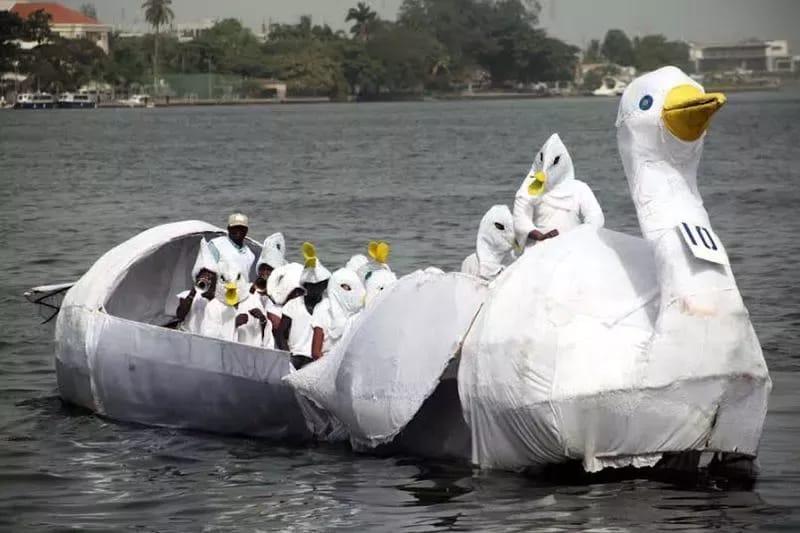 | Plate 1. Local Community Group participating at the boat competition. (Source: Field Survey, 2015.) |
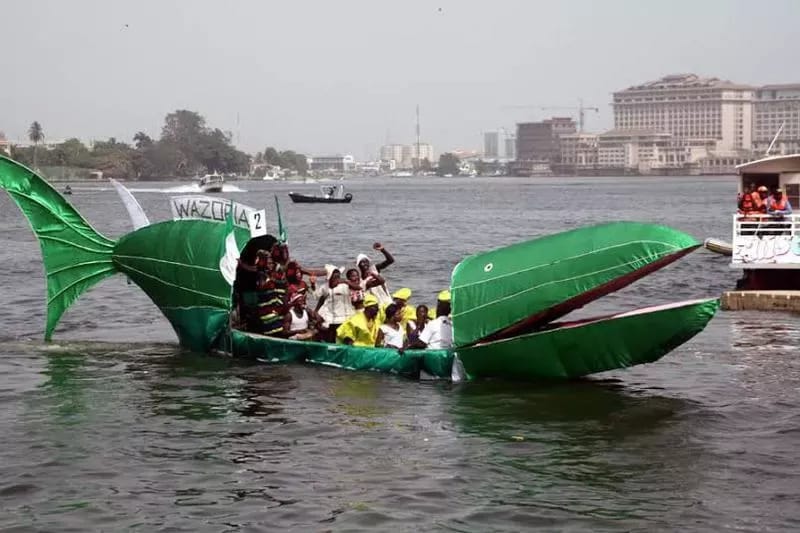 | Plate 2. Local Community Group participating at the boat competition. (Source: Field Survey, 2015) |
Lagos Water Regatta is part of the activities lined up to celebrate the yearly edition of the Lagos Black Heritage Festival. The regatta is a private sector-led initiative with support from other corporate bodies and the state government to promote the tourism potential of the state. The Regatta consist of large fishing boats, ferries, barges and other marine vessels adorned with colours and decorations depicting the social, cultural, traditional folklores and occupational aspects of the Lagos people (Jawando, 2015).The Lagos water regatta has yearly attracted participation from both within and outside the state with participants featuring at most of the activities at the festival such as open water swimming, boat race and the traditional boat parade, among others. The activities which usually takes place at the Oyinkan Abayomi drive, Ikoyi, Lagos has influenced the area, hence the place now referred to as the “Lagos Water Regatta Village”.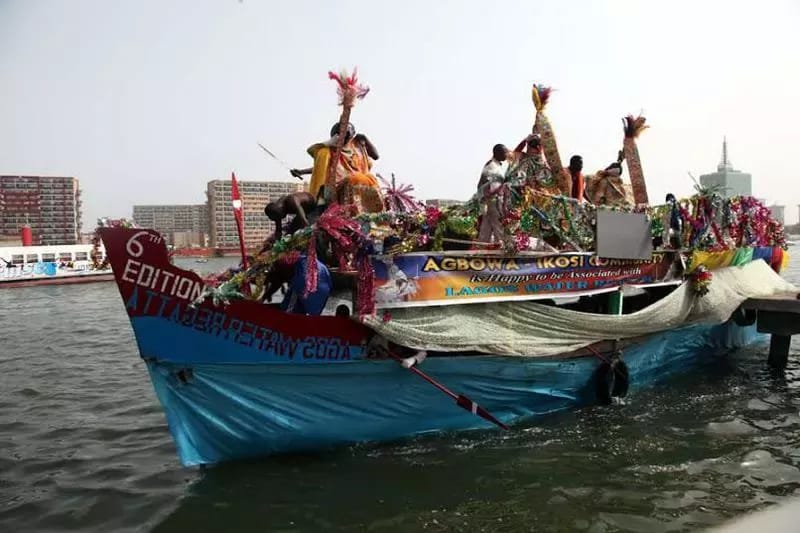 | Plate 3. One of the participating community in their decorated boat parading in the water (Source: Field Survey, 2015.) |
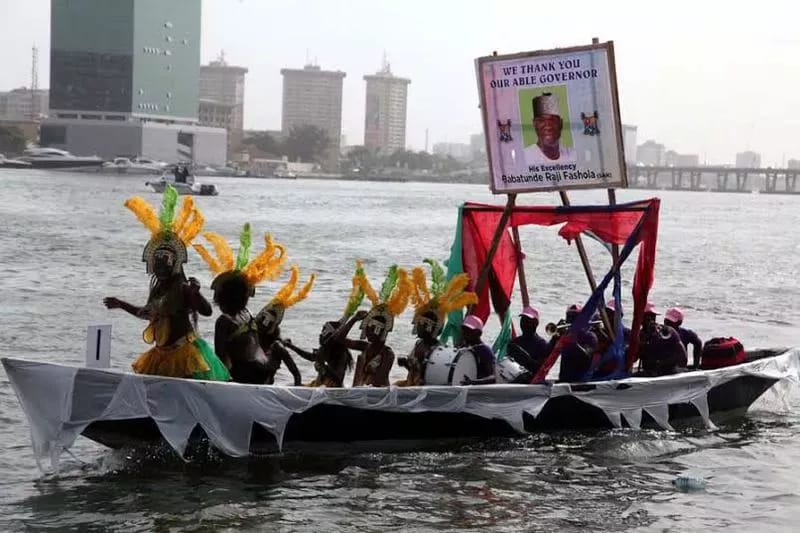 | Plate 4. One of the participating community in their their decorated boat parading in the water (Source: Field Survey, 2015.) |
Inset in plate 4, the community is carrying the portrait of the initiator of the festival (former Governor of Lagos State, Mr Babatunde Fashola).The Lagos Water Regatta usually features local communities within Lagos such as; Ibeju-Lekki, Badagry, Campos, Epe, Olowogbowo, Awori, Ibeshe, Takwa Bay, Agbowa-Ikosi, among others. Also, some governmental and non-governmental agencies organizations such as the Lagos Waste Management Board Authority (LAWMA), Marine Services, First Bank PLC, Key Stone Bank and the Lagos Internal Revenue Service are participants (Babatunde, 2015).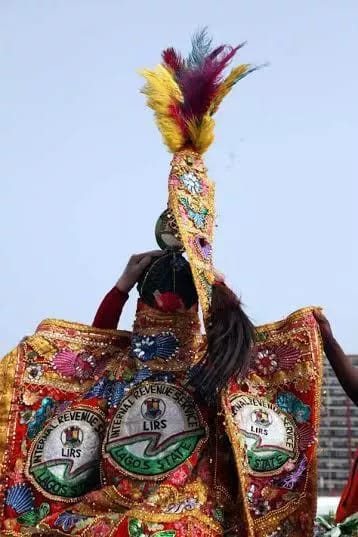 | Plate 5. Lagos Internal Revenue Service on Parade during the festival. (Source: Field Survey, 2015.) |
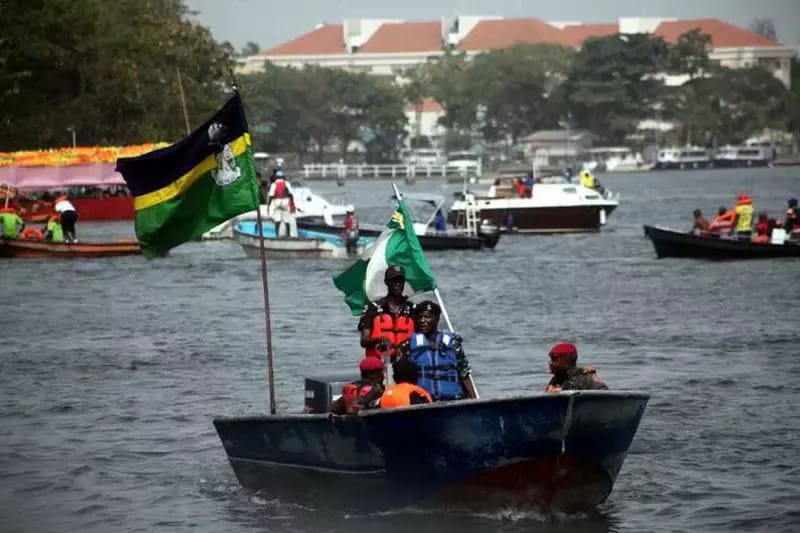 | Plate 6. Nigeria Police on security parade during the festival. (Source: Field Survey, 2015.) |
Highlights at the event usually features such other organizations as the National Association of the Tourist Boat Operator and Boat Transporters of Nigeria and Lekki-Lagos Free Trade Zone among others included the giving of prizes to winners of the various competitions such as the boat parade, open water swimming which features men and women categories and exotic displays by Lagos Jet Skiing Club.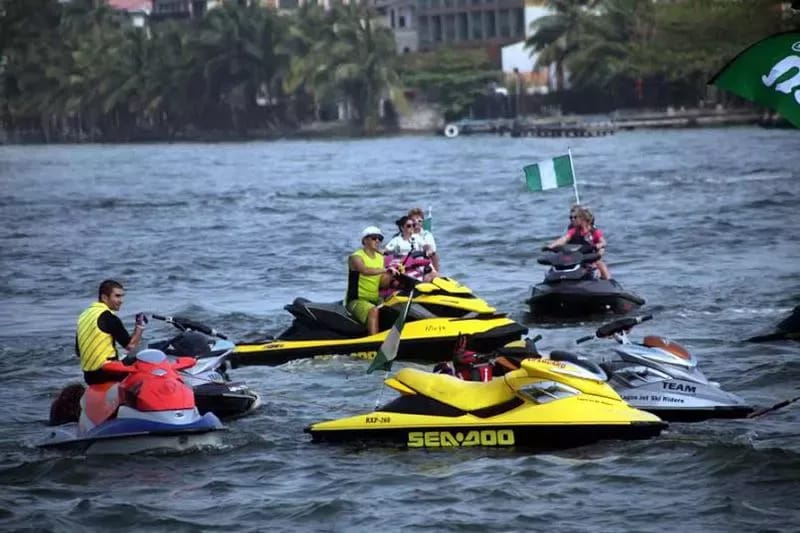 | Plate 7. Foreign Tourist at the Festival (Source: Field Survey, 2015.) |
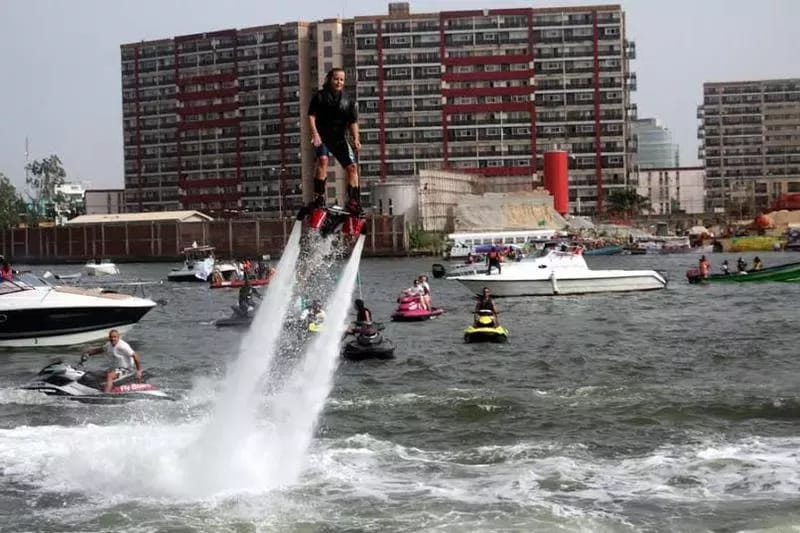 | Plate 8. Foreign Tourist at the Festival (Source: Field Survey, 2015.) |
The festival also usually features prominent Nigerians and members of the international community as well as entertainer and fun seekers across the globe. Aside from attracting tourist, from home and abroad, to this area, it has also promote the economic activities of the area.
1.5. The Lagos Carnival
The Lagos Carnival is an occasion of glamor, color, fun, beauty and a rich display of the culture of Lagos with various groups representing diverse neighborhoods, communities and selected associations in Lagos. The participants marched in a procession through different routes like Bourdillon Road-Giwa Barracks- Falomo Roundabout- Awolowo Road,-King George V Road-Bamgbose –Campos Square- Catholic Mission Street to put up a masterful display at the Tafawa Balewa Square Lagos which is the venue of the grand finale. 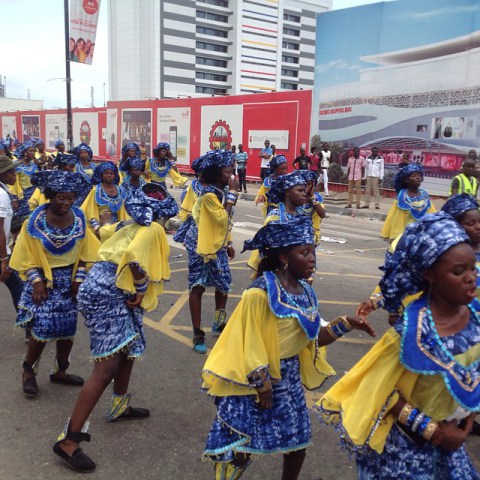 | Plate 9. Participating Communities dancing during procession to the venue of the grand finale. (Source: Field Survey, 2015.) |
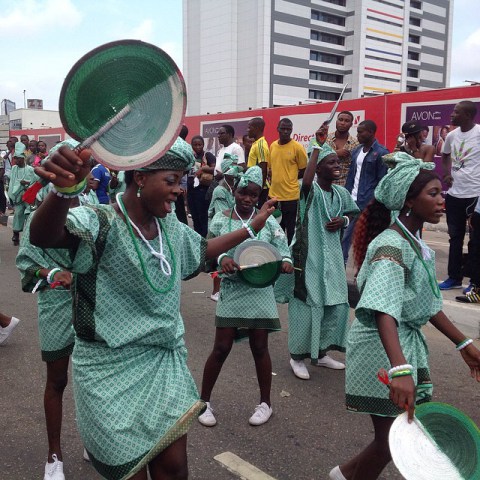 | Plate 10. Participating Communities dancing during procession to the venue of the grand finale. (Source: Field Survey, 2015.) |
The participating adult Carnival groups include, Lafiaji, Epetedo, Oko Faji, Locomotion, Obalende, Isale-Eko, Ogba, Woro Group, Ikeja, Emerald, Surulere, Ilasamaja, with many of the members made up of predominantly the youth.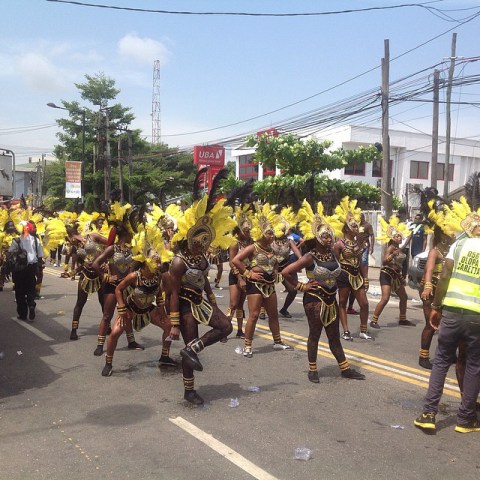 | Plate 11. Participating Communities dancing during procession to the venue of the grand finale. (Source: Field Survey, 2015) |
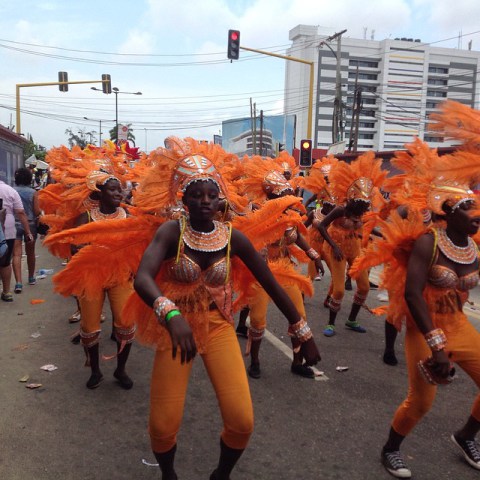 | Plate 12. Participating Communities dancing during procession to the venue of the grand finale. (Source: Field Survey, 2015.) |
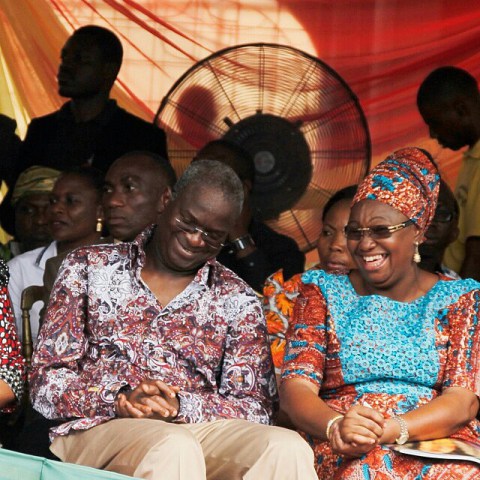 | Plate 13. Host Governor and his wife at the venue of the grand finale. (Source: Field Survey, 2015) |
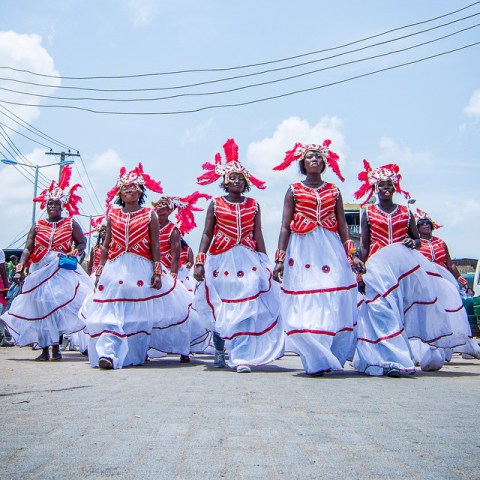 | Plate 14. Participating group on parade at the venue of the grand finale. (Source: Field Survey, 2015) |
According to Babatunde (2015), the carnival day is a great family day where all the children, parents and friends can come out, dance, sing, display and generally have fun, stressing that a nation that has so many young people needs many more of this kind of activity to expend the energies that it has and to channel them to productive purposes.
2. Theoretical Framework
2.1. The Social Exchange Theory
Social Exchange theory is a social psychological and sociological perspective that explains social change and stability as a process of negotiated exchanges between parties. Social exchange theory posits that all human relationships are formed by the use of a subjective cost-benefit analysis and the comparison of alternatives. The theory has roots in economics, psychology and sociology. Social Exchange Theory features many of the main assumptions found in rational choice and structuralism.Social Exchange theory was introduced in the 1960’s by George Homans. Homans’s primary concern within this field was focusing on the behavior of individuals when interacting with one another. He believed characteristics such as power, conformity, status, leadership and justice within social behavior was important to explain within the theory. Although there are various modes of exchange, Homans focused his studies on dyadic exchange.
2.1.1. Basic Concepts of the Social Exchange Theory
Costs are the elements of relational life that have negative value to a person, such as the effort put into a relationship and the negatives of a partner. (Costs can be time, money, effort etc.).Rewards are the elements of a relationship that have positive value. (Rewards can be sense of acceptance, support, and companionship etc.)The Social Exchange Theory perspective argues that people calculate the overall worth of a particular relationship by subtracting its costs from the rewards it provides.Worth = Rewards – CostsIf worth is a positive number, it is positive relationship. On the contrary, negative number indicates a negative relationship. The worth of a relationship influences its outcome, or whether people will continue with a relationship or terminate it. Positive relationships are expected to endure, whereas negative relationships will probably terminateOutcome = Rewards – CostsGeorge Homan developed five key propositions that assist in structuring individuals behaviors based on rewards and costs. The first proposition, the Success Proposition states that behavior that creates positive outcomes is likely to be repeated. The second Proposition, the Stimulus Proposition believes that if an individual’s behavior is rewarded in the past, the individual will continue the previous behavior. The third Proposition, the Value Proposition believes that if the result of a behavioral action is considered valuable to the individual, it is more likely for that behavior to occur. The forth Proposition, the Deprivation- satiation Proposition believes that if an individual has received the same reward several times, the value of that reward will diminish. Lastly the fifth Proposition, discusses when emotions occur due to different reward situations.
2.1.2. Relevance of Social Exchange Theory to the Study
Many social researchers have applied the Social Exchange theory to explain residents’ perceptions, attitudes and participation towards tourism planning and development (Allen et’al, 1988). Most of these studies evaluated local community perception and participation of tourism development, and their support for further tourism development on their particular regions. Social exchange theory involves the trading and sharing of tangible and intangible resources between individuals and groups where resources can be material, social, or psychological in nature (Pongponrat, 2011). For the purpose of tourism sustainability in a community, a certain exchange must occur. Participation of community residents, governments and the attraction of tourists to their communities are mainly driven by the desire to improve the economic and social conditions of the area (Lundberg et’al, 1995). That is, residents’ participation in tourism planning and developing stage, and the operation of tourists’ attraction could contribute to the wellbeing of the community by maximizing benefits to be gained from tourism returns.
3. Methodology
Survey method was adopted for the study, the researchers made use of questionnaires, key informant interview and participant observation methods of data collection to gather information required for this study. The researcher made use of selective and random sampling techniques to select foreign and local tourist respectively. A total of four (4) Research Assistants were employed in addition to the authors for the study. After a brief training based on the research focus prior to the 2015 edition of the festival, a total of 400 questionnaires were administered physically to both local and foreign tourists during the festival, and only 387 questionnaires were returned valid.The questionnaire is divided into two sections; namely section A and section B. The section A consists of seven questions relating to the socio-demographic data of the respondents while section B, consist of twenty questions that are related to the focus and objectives of the study. Members of the festival planning committee and local residents were also interviewed and the researcher himself was part of the festival as an observer.Data gathered were analyzed using simple percentages and charts for data presentation and proximity matrix.
4. Results and Discussion
Demographic Analysis of participants at the festivalData gathered from the demographics of the participants revealed that majority of the participants are within the age grades of 30-39 years old (44%) and 40-49 years old (36%) which accounts for 80% of the participants population. These age range accounts for the larger population of working class and active workforce of Lagos population.52% of the participants are male while 48% are female, although the difference in the percentage population is not very significant. Hence we posit that the festival is well attended by both male and female.60% of the participants are married, 20% are single, 12% are divorced while 8% are widow. This implies that majority of the participants are married. This correlates with the data presented in table 1 in the sense that the majority of the participants who are between the age of 30 and 49 years old are expected to be married.Table 1. Distribution by Age
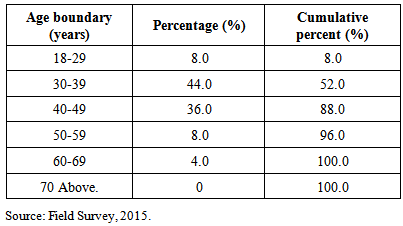 |
| |
|
Table 2. Distribution by Gender
 |
| |
|
Table 3. Distribution by Marital Status
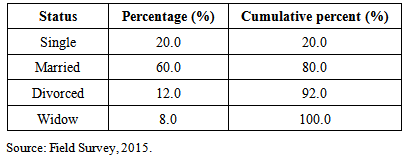 |
| |
|
16% of the participants are public servant, 24% are workers in organized private sector while 60% are self employed. This implies that civil servant and organized private sector workers in Lagos State were not many that attended the festival, although, reasons not ascertained. But one can reason that the self employed people are of the largest population because they have greater control over the management of themselves, their business and their time. This buttress the fact that, availability of discretionary time is a very significant factor that affects peoples’ participation in tourism activities.Most of the participants are of the Islamic religion (52%), 32% are Christians, 4% are traditional worshipers while 12% worship other kinds of religion. This reveals that Islamic believers in Lagos State likely attend the festival more than any other religious believer in the state.12%, 36% and 16% of the participants are ND/NCE, HND/B.Sc and Masters/PhD holders respectively. This reflects that about 64% of the participants are graduates of higher institution of learning; hence, we can reliably refer to them as been educated. We can also state in accordance with the data presented in table 4 that majority of the participants are educated and self employed and this category of people participates in the Lagos Black Heritage Festival.Table 4. Distribution by Occupation
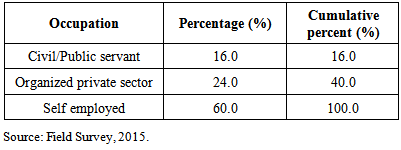 |
| |
|
Table 5. Distribution by Religion
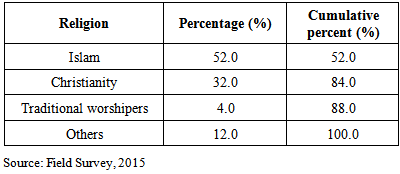 |
| |
|
Table 6. Distribution by Educational Qualification
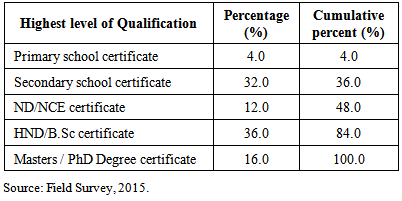 |
| |
|
Table 7. Distribution by Duration of Stay of visiting tourists
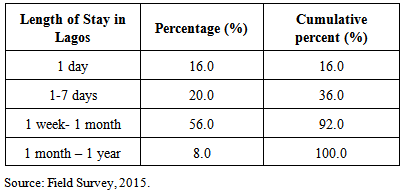 |
| |
|
56% of the tourist that participated in the 2015 edition of the festival stayed between one week and one month in Lagos for the festival, 20% stayed between one day and one week, 8% stayed between one month and a year while 16% are on a day visit to the city of Lagos for the Lagos Carnival. This implies that 56%, 20% and 8% (that is 84%) would require transport and accommodation facilities and would as well feed in Lagos for more than a week, day and month respectively. This surely will positively impact the economy of Lagos. Although, further clarification revealed that out of the 84% only 36% of the participants indicated that they would be staying in paid lodging facilities all through their stay. Others would be accommodated by either family/relative or friend(s), but this does not implies that the local economy would not benefit from their spending on other needs.Table 8 below reveals that majority (56%) of the 2015 Lagos Black Heritage festival attendees especially at the Lagos Water Regatta and the Lagos Carnival got information about the festival from radio/television broadcast. 20% of the participants also got the information from the internet sources. This implies that the electronic media was the means in which 76% of the participants at the 2015 Lagos Black Heritage Festival got information about the festival. 8% and 4% got information about the festival through the newspaper and posters respectively while 12% got the information through words of mouth from people. This also implies that the print media accounted for 12% of the participants at the festival. This does not means that the print media is not an effective means of communication, but from the data presented in table 8, it implies that majority of newspaper readers who are likely elite and workers in government and other public/private corporate bodies are the ones that were not much in attendance at the festival. This is equally in line with the information in table 4 on occupation of the festival participants.Table 8. How participants got information about the 2015 Lagos Black Heritage Festival
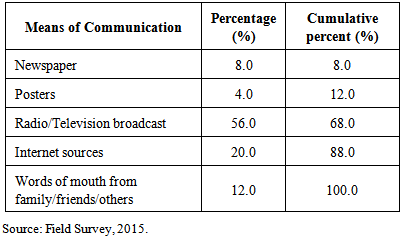 |
| |
|
From Table 9 below, and the propositions of George Homan in the social exchange theory as stated in the theoretical framework of this study, the festival can be said to be successful with 80% and 78% of the respondents having positive attitude and being appreciative of the cultural value of the host community respectively. Also the positive experience cum value derived from money spent and the satisfaction derived as expressed by 84% and 71.3% of the respondents respectively is an indicator that the activities of the festival is likely sustainable for cultural and socio-economic promotion.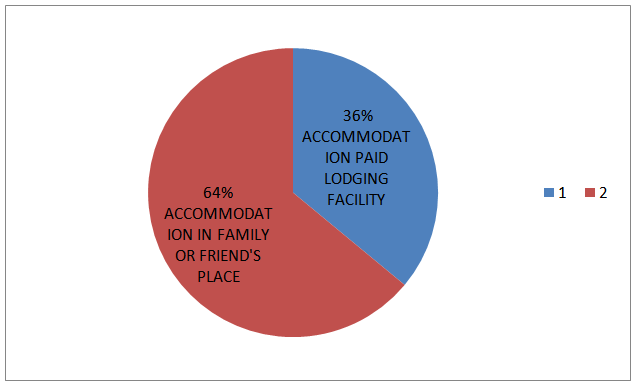 | Figure 1. Participants’ Means of Accommodation During their stay for the Festival. (Source: Field Survey, 2015.) |
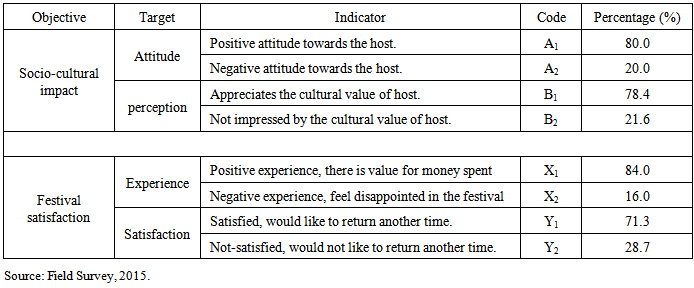 | Table 9. Festival Attendees’ Perception |
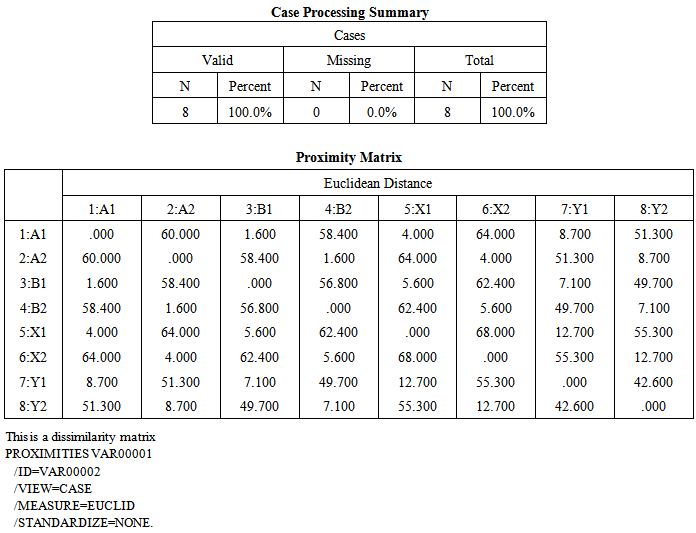 | Table 10. |
Figure 2 below indicates that 80% of the participants have positive attitude towards the festival, and 78.4% appreciates the culture of the host community. There is correlation between A1 (80.0%) & B1 (78.4%) and A2 (20.0%) & B2 (21.6%), A1 & B1 and A2 & B2 differs by 1.6% which is of less significance. Hence, we posit that the festival is having a positive socio-cultural impact on the host community.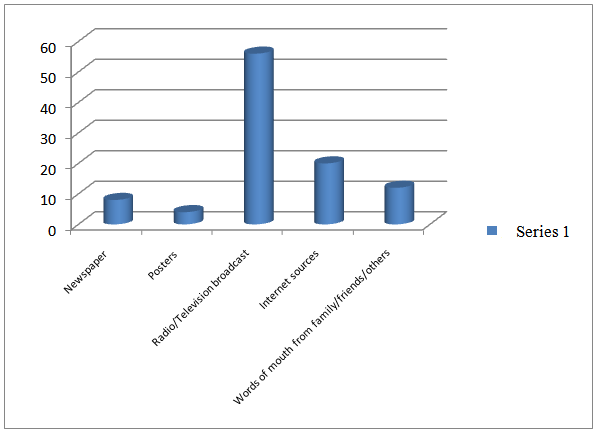 | Figure 2. Most effective means of communication that invited people to the festival. (Source: Field Survey, 2015.) |
Figure 3 below indicates that 84.0% of the participants have positive experience and they posit that they got value for the money they spent on the festival, 71.3% of the participants were satisfied with the festival and they would like to come for the festival another time. 16.0% had a negative experience and 28.7% did not show interest in coming for the festival another time. There is a common difference of 12.7% between X1 & Y1 and X2 &Y2 which is significant. Hence, we posit that a lot still has to be done to satisfy all the festival attendees. Although, larger percentage were satisfied and convinced that they got value for money spent. But the lesser percentage is significant enough to affect future attendance at the festival negatively if they spread their news of dissatisfaction about the festival.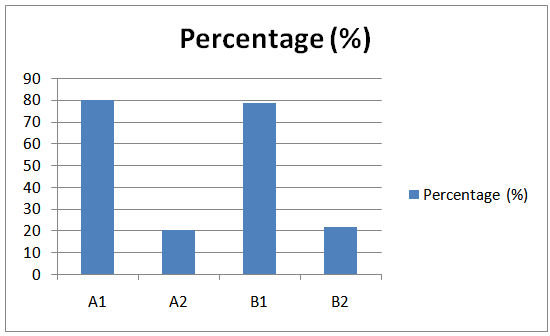 | Figure 3. Socio-Cultural Impact. (Source: Field Survey, 2015) |
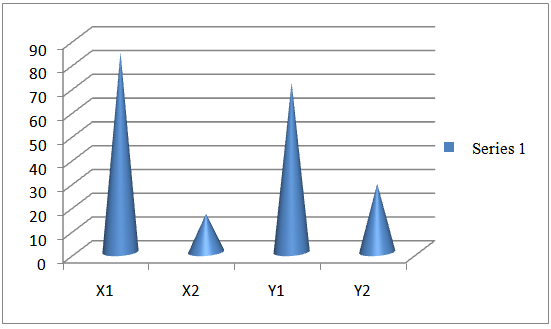 | Figure 4. Festival Satisfaction. (Source: Field Survey, 2015.) |
Further investigation during the interview section revealed that not all the local government councils in Lagos State partake in the festival activities, this is against the wish of some of the festival attendees who said their Local Government (Ikorodu Local Government) was not part of the 2015 edition of the festival. Some of the participants at the festival were of the position that, there should be more security in place during the street parade from Falomo to the venue of the grand finale (Tafawa Balewa Squre) in case of any stamped. Also some other participants opines that, at the venue of the grand finale of the Lagos Carnival there should be various performances in order to entertain visitors as they await the parade from the street procession. Majority of the interviewee also complained that the awareness campaign was not enough because many of their associates complained that they did not get the information early enough for them to prepare for the festival. And some advised government of Lagos State to take the awareness campaign to the foreign media aside from the internet in order to attract more foreigners to the event and make the festival more elaborate to improve participants’ level of satisfaction.
5. Conclusions and Recommendations
5.1. Conclusions
The Lagos Black Heritage festival is a relatively new festival which was initiated by the Lagos State government in the year 2009 (about six years ago) and has gone beyond a local festival which is already attracting international tourist even though yet on a large scale. Although, many of the festival attendees are educated, but it is worrisome that many of the elite residents in the state were not present at the festival. Findings revealed that the festival is contributing to the host community economically and socially and many of the festival participants are of positive perception about the festival and they were satisfied with their experience at the 2015 edition of the festival although with some comments.The social concentration that occurs at festival time and the increased economic activities consolidates the sense of advancement that is of concern in this study. The temporary realignment that transforms public places and the local people in them during festival time is a manifestation of the changes that occur with daily community relationships.The initiative of the Lagos State government is a laudable one and we conclude that the Lagos Black Heritage Festival is a worthy means of promoting Lagos culture and socio-economic advancement. It is hoped that the findings of this study would the useful to the Lagos State government and the planning committee of the festival for subsequent editions. We also hope that other festival organizers, academics and students would find this article useful.
5.2. Recommendations
1. Government of Lagos State should improve on awareness and sensitization campaign to encourage improved participation of the government workers (and other public/private corporate bodies) and foreigners in the festival.2. Government should encourage all local governments in Lagos State to participate in the festival and also introduce the use of bill boards in the publicity plans in order to ensure a wider reach of the adverts on the festival3. There should be improvement in security and the number of performing artist in future editions of the festival.
5.2.1. Areas of Further Research
Due to constraints of time, limited finance, access to top government functionaries that are in charge of planning and execution of the event itinerary, the researcher was unable to thoroughly investigate into the economic impact of the festival since it began in 2009 till date. This would have enabled the researcher to compare the trend since 2009 to date. The researcher therefore recommends further comprehensive research in this area.
References
| [1] | Allen, L. R., P. T. Long, R. R. Perdue, and S. Kieselbach. (1988). “The Impact of Tourism Development on Residents’ Perceptions of Community Life.” Journal of Travel Research, 27 (1):16-21. |
| [2] | Babatunde Raji Fashola (2015). Press Release, Office of the Executive Governor of Lagos state, Ikeja, Lagos. |
| [3] | Backman K.F, Backman S.J, Uysal M and Sunshine K.M (1995). Event Tourism; An Examination of Motivation and Activities, Festivation Management and Event Tourism. 3, pp 15-24. |
| [4] | Bramwell Bill and Bernard Lane (eds) (1994): Special Issue on Rural Tourism. Journal of Sustainable Tourism (pp.1 &2). |
| [5] | Demola Ojo (2015). Lagos Water Regatta for Easter. Thisday Newspaper. |
| [6] | Derrette R (2008). Regional Festivals; Nourishing Community Resilience: The Nature and Role of Cultural Festivals in Northern Rivers NSW Communities, PhD thesis, Southern Sross University, Lismore, New South Wales. |
| [7] | Disun Holloway (2015). Opening Speech from the office of the Governor of Lagos State on Lagos Water Regatta, 2015. Delivered at the venue, Oyinkan Abayomi Drive, Ikoyi, Lagos. |
| [8] | Jawando Olusegun (2015). Welcome Address Delivered at the 2015 Lagos Water Regatta Venue, Oyinkan Abayomi Drive, Ikoyi, Lagos. |
| [9] | Lundberg, D.E, Krishnamooorthy, M. and Stavenga, M.H (1995), Tourism Economics, New York, NY: John Wiley & Sons. |
| [10] | Mark W. Brunson (2002). Evaluating a Special Nature-Based Tourism Event. Utah Recreation and Tourism Matters. Institute for Outdoor Recreation and tourism, Utah State University, Utah. |
| [11] | Oluwatosin Adeoti A (2013), Traditional Religious Festivals and Modernity; A Case Study of Female-Oriented Cult Annual Festival in Ijebu land of South Western Nigeria. International Journal of Humanities and Social Science. Vol. 3, No 9. Pp 267-276. |
| [12] | Pongponrat K (2011). Participatory management process in local tourism development: A case Study on fisherman village on Samui Island, Thailand. Asia Pacific Journal of Tourism Research, 16: 57-73. |
| [13] | Szabo Janos Zoltan (2012). Festivals as New Form of Culture, PhD thesis, University of Debrecen. |























 Abstract
Abstract Reference
Reference Full-Text PDF
Full-Text PDF Full-text HTML
Full-text HTML






